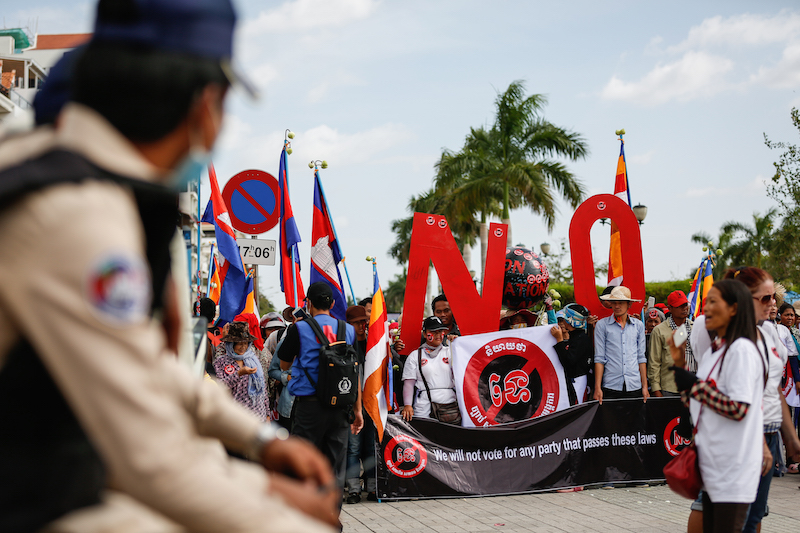Two years since CPP lawmakers unanimously approved a widely criticized law regulating the country’s NGOs, Cambodian organizations say they are still unclear on how to comply with some of its vaguely worded provisions, forcing them to operate under the fear of arbitrary shutdown.
Guidelines for implementing the law have not been released and “we don’t actually know how to comply with this. It has never been explained,” said Soeung Saran, executive director of housing rights group Sakmakum Teang Tnaut. “We actually are worried about that.”

Although his organization had submitted paperwork according to its reading of the law, Mr. Saran said he hoped the government would promptly detail proper procedures.
Eang Vuthy, executive director of family advocacy NGO Equitable Cambodia, said a warning issued last week by the Interior Ministry telling all NGOs to fully comply or face consequences—made amid controversy over an election monitoring consortium—was in fact the first public instructions about the law given to organizations.
In the lead-up to the July 13, 2015 National Assembly vote—boycotted by the opposition—the U.S., U.N. and E.U. joined hundreds of local and international organizations in criticizing the Law on Associations and Non-Governmental Organizations, or Lango. It went into effect a month later when King Norodom Sihamoni gave it his approval.
Since its passage, Lango “has had a severe chilling effect on Cambodian civil society,” said Chak Sopheap, director of the Cambodian Center for Human Rights. “Its broad and ambiguously worded provisions—such as the infamous ‘neutrality’ requirement in Article 24—combined with draconian sanctions, mean NGOs and associations must constantly operate in the shadow of possible legal action and even being shut down,” she said, referring to an article requiring political impartiality.
Interior Ministry spokesman Khieu Sopheak could not be reached. But government spokesman Phay Siphan said organizations that claim the guidelines are vague were simply “ignoring” the information before them.
“What kind of information do they want is the question,” he said, adding that the government had been “very open” about NGO law requirements. “The way I feel is that it’s very fair and very open for the NGO law, unless they have a hidden agenda against the NGO law,” Mr. Siphan added. “The government is not enemies with the NGOs.”
Josef Benedict, Amnesty International’s deputy director of campaigns for Southeast Asia and the Pacific, said with general elections a year away, NGO work is “under more government scrutiny than ever…. These provisions are extremely worrying.”
The government last week ordered the election monitoring group dubbed the Situation Room to halt current and future observations for allegedly failing to comply with the neutrality article and for not registering as an organization. The group had recently issued its assessment of the commune elections, saying the vote could not be considered completely free and fair due to an atmosphere of intimidation in the lead-up to the June 4 vote.
Sebastian Strangio, author of “Hun Sen’s Cambodia,” said Lango had been enacted as part of the ruling party’s long-running drive against independent organizations. The CPP has “been preparing a rhetorical ground for years by describing these groups as opposition, as hostile to the government,” he said. “So once that ground has been prepared, the signing of the law or the drafting or passing of the law was really just the final flourish.”
“Hun Sen has these laws in his back pocket for when he needs them, but there’s no need to engineer a sector-wide crackdown,” he said.
Phil Robertson, deputy Asia director at Human Rights Watch, said it was a matter of time until the first NGO was shut down.
The only question “is who will get hit, when it will happen and what will be the circumstances.”



